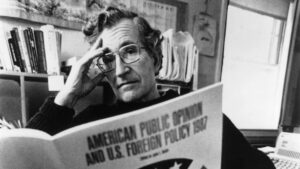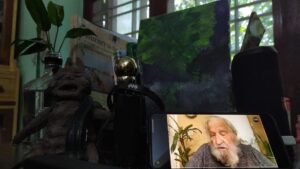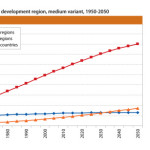Noam Chomsky: The Persistent Prompt Out Of Propaganda Bubbles
No Comments yet
Noam Chomsky
09-23-2024 ~ In June 2024 I was listening to Noam Chomsky (recorded) trying to make sense with extremely good poise to a Times journalist to think outside western propaganda bubble.
In 2023 and 2024 I have listened to him responding to the polemic-interviews like that of Times as well as the more independent, alternate or amateur media. I get transported in time back to the 1999-2000 when I listened to the voice for the first time, except for the fact that now I was listening to a mind in his mid-nineties. This was, the opposite of the fast fatalistic human beings who often surround us with their system conservative spiritualisms, not a mind that aged chronologically and hence finds solace in a time they froze at, nor was this an unprovocative mind to whom the demagogues could find consensus.
When an interviewer asked polemically in 2023 whether he thought, after all these years, he was wrong on occasions, Noam peacefully replied “many times”. And then he went on to say that he was for example wrong to get later that he should have in the opposition movement to the US led war on Vietnam. This from a human being in his mid-nineties is nothing short of sheer hope. It increases the spectrum of possibilities, whether or not one uses it. I know that after the massive stroke he had in 2023, Noam may not speak his mind out again. But I heard that expressions rise in him when he listens to the ongoing wars on Palestine and violence on life. That is the most a brain can be in a life time I suppose.
Personally, the new, profound and disruptive voice I first heard in a documentary by the end of 90s, have transformed to an insistent voice of hope. Video cassettes that were played in old VCR machines of the day that brought out often flickering images and analogue tape VHS output has long gone. I sense somewhere along the days I have also lost much of my ability to listen, though audio-visual hours have statistically increased in the digital-now.
Noam’s academic trajectories in the domain of linguistics, morphophonemic (s), generative grammar, syntactic structures or mathematical linguistics, are of course archipelagos far away for me. I have been caught in the crossfires of the more informed agreements and disagreements about those worlds, but in my comfortable ignorance. On the other hand, Manufacturing Consent: Noam Chomsky and the Media, the 1992 documentary, brought home by a friend as a video cassette recording, left a great imprint. I had never imagined Media through the sieves of elite groups, propaganda or the unwillingness to portray certain events coupled with the added emphasis on others.
I vividly remember the shots of the Chimpanzee that was named Nim Chimsky as an evident pun on Noam Chomsky, in a Columbia university language project. Apart from the stage setting part wherein the linguistic work, the development of his particular rationalistic explanations, syntactic structures vis a vis the semantics, human cognition as against behaviorisms as well as the schools he was associated with as a linguist, the documentary was more about how thought controls happen in modern democracies.
The media, the agenda settings and the opinion making on which he let loose unprecedented disruptive thoughts, made The New York Times describe him as arguably the most important intellectual alive. But of course, the NYT had more to add. They went on to describe him as “disturbingly divided in intelligence”. They lamented that despite being an intellectual he writes such terrible things about American Foreign policy. They charactered his science as complicated and political views as “simple minded” (and hence irrelevant). Chomsky though was evidently relieved that the New York times in 1979 had the negatives to follow the opening exaltations. In fact, the irritations of the mainstream media are a good preface to what Chomsky has been doing throughout his responsible interventions right from the 60s to the day he suffered the stroke.
Noam introduced me to ideas in the political spectrum like libertarian socialism or anarcho-syndicalism. It told me how he and others who came out of civil war and anti-war movements saw the system. There was the occasional tuning into the alternate radio stations and the recordings of the telecasts by David Bersamian and those at Z magazine. Later some of these conversations came out in print. What got me hooked to his thoughts was the analysis of technologies within democracies that envisage ignorant masses, who in fact can only be meddlesome and hence needs to be controlled for their own good.
Manufacturing Consent: The Political Economy of Mass Media (1988) coauthored by Edward S Herman as well as Necessary Illusions: Thought Control in Democratic Societies with which this was followed up in 1989, in retrospect were even more perceptive of the unipolar world order and the eulogies that celebrated liberal democracies post 1990s in the mainstream. The former, donated the under graduate psychology-thesis writer a name to title his small dissertation on political opinion making in 2001. My writing innocently and confidently claimed to throw light on how cognitive consent for the prevailing political order, then acquiring communal and neoliberal tenor across India, was crafted through every day deployment of themes, agendas, frames, and modes of interactions.
The haunt of Noam had already prompted longer trajectories, one of which was my post-graduation. For someone who was otherwise enthusiastic about ecologies, behaviours, animals and cognition, ‘International relations and Politics’ was smuggled in alongside the persistent urge to explore the tracks suggested. I followed up Necessary Illusions with Deterring Democracy (1991) that for the first time opened frames of cold war, global system, post cold war or imperialism. Understanding Power (2003) further widened the possibility of exploring how power of the empire designed in the shape of the United States of America operated simultaneously outside (Vietnam) and inside (on Welfare system), sovereign states.
I remember getting thrilled to find two other works on a stroll across a book fest in the Kochi City’s marine drive. Those days the book strolls were all about gathering as many works by Chomsky as I can! Powers and Prospects: Reflections on Human Nature and the Social Order (1996) and Profit Over People: Neoliberalism and Global Order (1999) added more reasons to charge up for the post-graduation. The intensity of the brutal suppressions in East Timor by the Indonesian military with a complicit and often supportive US regime ever since the mid-60s that Powers and Prospects talked about was a major prompt to get beyond the given. Why did the liberal global media play down a genocide that reached almost a million and practically eliminated one of the largest communist workers parties the PKI, while playing up others? This was a great lesson on the profound idea of propaganda bubbles we live in. I already had a counter opinion to the celebrated liberal internationalist Woodrow Wilson, through the perspectives in Media Control (2002) of Creel Commission in turning a population as a war mongering mass. More Indian edition publications and those by alternate publishers and leftwing groups stacked the shelves. Class Warfare (1996), Rogue States (2000), Propaganda and the Public Mind (2001) were some of them. I thought I was ready to be a critical voice in my Masters classes. I realised later that other designs other than mainstreams in IR were taking shape through those years.
The last work in print I got was perhaps a booklet by Leftword called Government in the Future (2005) which was a reprint of his earlier lecture. Before the time when digital downloads got upper hand and print purchases went downhill for a while, Chomsky introduced me to others like Howard Zinn’s A People’s History of the United States (1999) and Water Lippman’s ideas of ‘Spectator Democracy’ wherein the public is reduced to complacent herds in capitalism. I owe the greater share of my engaged interactions during post-graduation to Noam Chomsky. I thought his voice faded away ever since, though the few instances I came across the audio of the man now in his 80s, I stayed put. By now I was in my research phase. I moved increasingly to ethnographies, urban ecologies and gradually into political ecologies.

Noam Chomsky – Photo: Mathew A. Varghese
It is amazing that off late; while designing courses in political ecology and the politics of climate, Noam Chomsky re-emerges as prompt par excellence. His perspectives on the IPCC, legislative regimes of climate, and reflections on consequences to organised life were of a fresh researcher in her/his prime. Critical scholarship on broad frames like climate economics and observations on hegemonic actors like ExxonMobil was as updated as during the 1960s. I have listened to the extrapolations he made on the nexus between Koch brothers and GOP, or the hijack of the COP28 by oil conglomerates and companies like Adnoc (Abhu Dhabi). In the last couple of years Noam spoke tirelessly and in volumes to disparate groups about alternative designs to capitalism. He elaborated on green commitments that needs to be made out of the GDPs as well as the domination by finance capital and banking systems, even to belligerent interviewers.
There are inevitable bio-physical silences that all life gets into, while alive or otherwise. But what matters is what went on before those silences. We live in times when, strings of silences can be garbed as a loud continuum of breaking news, facts and technologies of mediation proliferate, or fixes and fatalisms precede any attempt to understand the leviathan. Perhaps why I always pause and listen every time I hear Noam speak is because I have felt that he was never silent. He spoke for seven decades despite the behemoths and myths of capitalist consensus. An interviewer started off in 2023 with the sarcastic statement of Noam being the greatest intellectual on par with big names. Then he asked how he likes to be described or would write if he fills a form and whether he is a public intellectual. The nonagenarian with a smile told him not to read too much PR. Then he replied that he teaches continental science and philosophy like any other who works as a teacher in a university. He said he never took the latter tag seriously and that the interviewer and himself probably has more privilege to get public with their intellect than another one who might hold better opinions but no privilege! The MIT professor kept communicating with the public often written off by mainstream as “ignorant meddlesome outsiders” and on the face of the newer avatars of The New York Times of 70s that forever failed in writing him off as “disturbingly disconnected” and “maddeningly simple minded”.
Mathew A Varghese
SIRP, Centre for Urban Studies, M G University
You May Also Like
Comments
Leave a Reply







